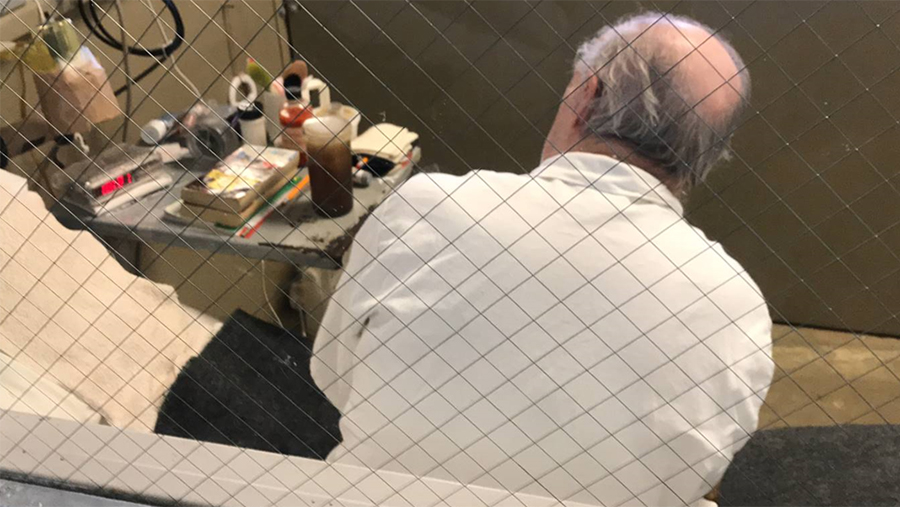Connecting state and local government leaders
“You’re going to see devastation that’s unbelievable.”
This story originally appeared on Stateline, an initiative of the Pew Charitable Trusts.
HUNTSVILLE, Texas — Here in the Estelle prison unit, most of the male inmates in the geriatric dormitory first ran afoul of the law years or even decades ago, convicted of crimes ranging from murder and sex offenses to forgery and repeat DWIs.
Today, any outward hint of menace has evaporated. White-haired, frail and often tethered to canes or wheelchairs, they live in small rectangular cubicles and while away the days in unwavering sameness.
As the coronavirus pandemic sweeps the globe, prisoner advocates are warning of the potential for a disastrous outbreak among inmates. The elderly are most vulnerable, and the U.S. inmate population is aging. Jails and prisons, crowded places where social distancing is nearly impossible, are breeding grounds for contagious disease.
“These prisons are bacteria factories,” said Rick Raemisch, a consultant and former executive director at the Colorado Department of Corrections. “I don’t think people understand the gravity of what’s going to happen if this runs in a prison, and I believe it’s inevitable.
“You’re going to see devastation that’s unbelievable.”
New York inmates tested positive at Rikers Island and at a regional detention center in Brooklyn. The Texas Department of Criminal Justice reported its first two positive cases of COVID-19 this week: an inmate and an employee. A 37-year-old inmate has been medically isolated, and other inmates and staff who may have had contact with him are now being medically restricted. The contract employee was ordered to self-quarantine. The employee had contact with other prison workers and inmates, but so far none of them has developed symptoms.
While state prisons have resisted calls to release inmates, several large county and municipal jurisdictions have freed hundreds of jail inmates deemed low-risk, including seniors and those in poor health.
New Jersey plans to release as many as a thousand people from its county jails, including inmates jailed for probation violations and those sentenced for low-level offenses. Democratic Mayor Bill de Blasio said Monday that New York City may release more than 200 inmates, according to news reports. Los Angeles County and Ohio’s Cuyahoga County also have released prisoners.
Prisoner advocacy groups in more than a half-dozen states, including Texas, New York, Illinois, Pennsylvania, Indiana and Michigan, have called on governors to release state prisoners, especially elderly inmates, through compassionate release or medical furlough.
The Texas Criminal Justice Coalition, in a letter to Republican Gov. Greg Abbott, warned that people in prisons and jails are “particularly vulnerable to the disease” and, among other things, urged the governor’s office to identify the sick and elderly who are eligible for parole and “review their cases for immediate release.”
In New York, an organization led by a former inmate who was released two years ago after 38 years in prison is joining with other groups to demand that Democratic New York Gov. Andrew Cuomo and lawmakers grant clemency to “vulnerable” people in prison, including the old and sick.
“If it hits state prison, it’s going to hit hard,” said Jose Saldana, director of the Release Aging People in Prison Campaign. During his nearly four decades in state and federal prisons for bank robbery and attempted murder of a police officer, Saldana earned a college degree and became a role model of rehabilitation. Now 68, he has become a national campaigner for the release of elderly prisoners.
“This is very personal for me,” Saldana said. “You don’t just leave men you spend years in prison with and go on … as if they were never part of your life.”
U.S. prisons aren’t alone in wrestling with the issue, or in facing potential unrest. Earlier this month, Iran released some 54,000 prisoners. In Colombia, 23 prisoners died this past weekend in a riot over coronavirus fears.
State prison systems so far have sidestepped requests to release inmates. Instead, they are disinfecting more frequently and tightening screening at prison entrances, among other measures.
The Texas prison system, in compliance with emergency orders from Abbott, has barred visitation but is giving inmates greater access to their families by extending telephone privileges.
The prison system is emphasizing hand-washing and doing what it can to promote social distancing despite the obvious limitations in a prison environment, said Jeremy Desel, spokesman for the Texas Department of Criminal Justice.
“We’re doing everything we can in our power to socially distance folks as much as possible by slowing down offender movements and various other techniques,” he said, “but given the circumstances there will be times when there will be more people in one place than anybody would like.”

Other measures include screening arriving employees and county jail transfers, sanitizing buses and restraints between each use, and disinfecting offices and prison units several times a day. Staff members also are working remotely whenever possible. Under an order from the governor, Texas prisons have waived the copayment that is usually charged to inmates for medical visits.
Still, at least some advocates say those measures aren’t enough.
Casey Phillips, head of Texas Prisons Air-Conditioning Advocates, is married to Justin Phillips, who is four years into a 10-year drug sentence. “He’s terrified,” she said, adding that her husband has asthma, blood pressure problems and a kidney disease, and fears that COVID-19 will take root and spread in the Texas prison system. “He’s afraid it’s going to kill him.”
But David Mains, president and chairman of Texas CURE, the state’s oldest inmate rights organization, said he’s had largely reassuring conversations with four male prisoners and the relative of a female inmate. “Everybody I’ve talked to there was in good spirits,” he said, saying the inmates described the prison operations as “running as normal.”
Long before the emergence of the coronavirus, prison officials and state lawmakers across the country were concerned about elderly prisoners.
Patrick O'Daniel, chairman of the Texas Board of Criminal Justice, told board members in late February that the number of Texas inmates 55 or older is growing by nearly a thousand a year and has doubled over the past decade.
The aging baby boomers now comprise nearly 15% of the more than 140,200 men and women in Texas prisons. Nationwide, nearly 12% of inmates in state and federal prisons are older than 55.
Like their counterparts on the outside, elderly prisoners make up the lion’s share of health care costs, putting intense pressure on government budgets. Over a 10-year period ending in 2019, health care costs for the elderly in Texas prisons increased from $51.8 million to $114.7 million, encompassing often complicated and costly treatments for illnesses such as cancer, diabetes, kidney disease, hepatitis and a whole host of other aging-related ailments.
In fiscal 2019, the average annual hospitalization cost for an elderly inmate was $5,900, compared to $1,000 for an inmate under 55, according to the Texas Department of Criminal Justice.
Many inmates entered prison unhealthy to begin with, weakened by drug use, poor nutrition, irregular sleep patterns and other examples of hard living. Consequently, prison experts peg 55 as the starting point for old age in prison and generally rank prisoners as being 10 years older physically than residents on the outside.
“Unfortunately, a lot of our patients have not had great health care coming into prison,” said Dr. Owen J. Murray, the prison system’s vice president for offender health services, who oversees health care for 80% of the state’s inmate population. “And this isn’t unique to Texas. The same thing is going on in every state.”
Prisons built to house young and middle-age lawbreakers continue to be retooled to accommodate prisoners who are no longer physically able to climb onto a top bunk or can’t make the long trek down a prison corridor without a walker, cane or wheelchair. Many are bedridden or suffer from dementia.
William Mays, a 60-year-old former investor who ended a five-year prison sentence for securities fraud in October, recalls watching older inmates trying to make their way through daily prison life. “They’re not as mobile as they used to be,” he said. “This is like going to boot camp at 60.”




